新版(人教版)七年级(下)英语Unit10课文详解
人教版七年级下册Unit 10 分课时课文听力+翻译

人教版七年级下册Unit 10 分课时课文听力+翻译UNIT 10 I’d like some noodles.Section A1b Listen and check(√)the noodles that the person orders.听录音,勾出那个人点的面条。
What would you like?I’m not sure yet. Are there any vegetables in the beef noodles?Yes, there are some tomatoes.OK. I ‘d like the beef noodles, please.你想要点什么?我还不确定。
牛肉面里有蔬菜吗?是的,有一些西红柿。
好的。
请给我来份牛肉面。
2a Listen and check (√)the names of the foods you hear.听录音,勾出你听到的食物的名字。
What size would you like ?I’d like a large bowl of noodles.And what kind of noodles would you like?I’d like chicken, potato and cabbage noddles.And how about you?I’d like a medium bowl.What kind would you like?I’d like beef and tomato noodles, please.你想要什么尺寸的?我想要一大碗面条。
你想要哪种面条?我想要鸡肉、土豆和卷心菜面条。
你呢?我要一个中碗的。
您想要哪种?我要牛肉西红柿面。
2b Listen again. Complete the sentences.再听一遍。
完成句子。
What size would you like ?I’d like a large bowl of noodles.And what kind of noodles would you lke?I’d like chicken, potato and cabbage noddles.And how about you?I’d like a mediumbowl.What kind would you like?I’d like beef and tomato noodles, please.你想要什么尺寸的?我想要一大碗面条。
最新人教版初中英语七年级下册Unit10SectionB教材全解
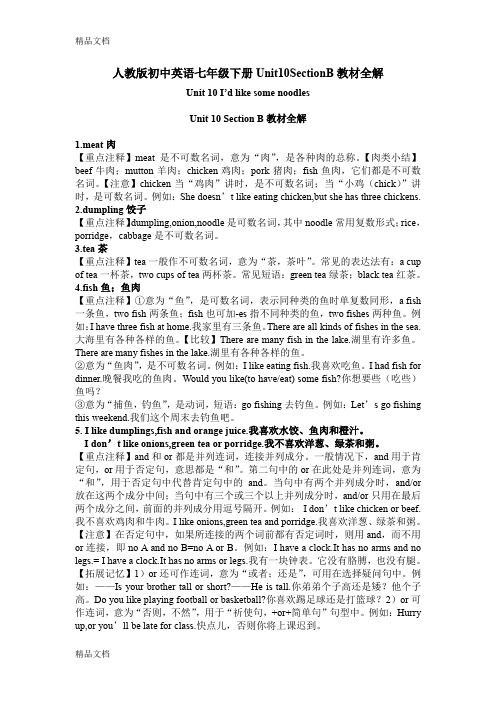
人教版初中英语七年级下册Unit10SectionB教材全解Unit 10 I’d like some noodlesUnit 10 Section B教材全解1.meat肉【重点注释】meat是不可数名词,意为“肉”,是各种肉的总称。
【肉类小结】beef牛肉;mutton羊肉;chicken鸡肉;pork猪肉;fish鱼肉,它们都是不可数名词。
【注意】chicken当“鸡肉”讲时,是不可数名词;当“小鸡(chick)”讲时,是可数名词。
例如:She doesn’t like eating chicken,but she has three chickens.2.dumpling饺子【重点注释】dumpling,onion,noodle是可数名词,其中noodle常用复数形式;rice,porridge,cabbage是不可数名词。
3.tea茶【重点注释】tea一般作不可数名词,意为“茶,茶叶”。
常见的表达法有:a cup of tea一杯茶,two cups of tea两杯茶。
常见短语:green tea绿茶;black tea红茶。
4.fish鱼;鱼肉【重点注释】①意为“鱼”,是可数名词,表示同种类的鱼时单复数同形,a fish 一条鱼,two fish两条鱼;fish也可加-es指不同种类的鱼,two fishes两种鱼。
例如:I have three fish at home.我家里有三条鱼。
There are all kinds of fishes in the sea.大海里有各种各样的鱼。
【比较】There are many fish in the lake.湖里有许多鱼。
There are many fishes in the lake.湖里有各种各样的鱼。
②意为“鱼肉”,是不可数名词。
例如:I like eating fish.我喜欢吃鱼。
I had fish for dinner.晚餐我吃的鱼肉。
人教PEP七年级英语下学期Unit10_SectionA_教材知识详解
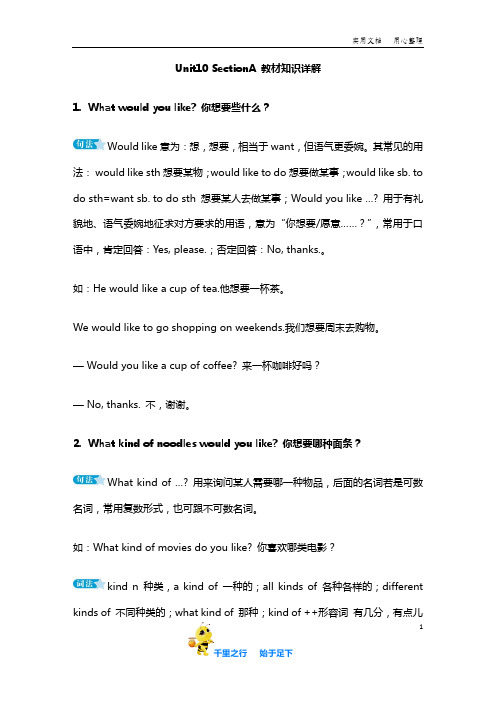
Unit10 SectionA 教材知识详解1.What would you like? 你想要些什么?Would like意为:想,想要,相当于want,但语气更委婉。
其常见的用法:would like sth想要某物;would like to do想要做某事;would like sb. to do sth=want sb. to do sth 想要某人去做某事;Would you like …? 用于有礼貌地、语气委婉地征求对方要求的用语,意为“你想要/愿意……?”,常用于口语中,肯定回答:Yes, please.;否定回答:No, thanks.。
如:He would like a cup of tea.他想要一杯茶。
We would like to go shopping on weekends.我们想要周末去购物。
— Would you like a cup of coffee? 来一杯咖啡好吗?— No, thanks. 不,谢谢。
2.What kind of noodles would you like? 你想要哪种面条?What kind of …?用来询问某人需要哪一种物品,后面的名词若是可数名词,常用复数形式,也可跟不可数名词。
如:What kind of movies do you like? 你喜欢哪类电影?kind n 种类,a kind of 一种的;all kinds of 各种各样的;differentkinds of 不同种类的;what kind of 那种;kind of ++形容词有几分,有点儿1= a little /a bit +形容词。
如:The girl is kind of shy. 这个女孩有点儿害羞。
3. May I take your order? 你们现在点餐吗?该句是服务员询问顾客是否点餐的常用交际用语。
order在此处作名词,意为“点菜”。
人教新版英语七年级下册Unit10SectionB2a-3c课件(共35张PPT)
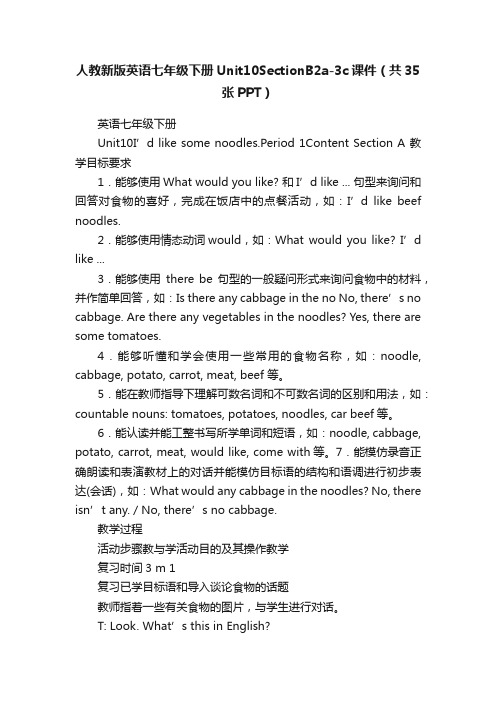
人教新版英语七年级下册Unit10SectionB2a-3c课件(共35张PPT)英语七年级下册Unit10I’d like some noodles.Period 1Content Section A 教学目标要求1.能够使用What would you like? 和I’d like ... 句型来询问和回答对食物的喜好,完成在饭店中的点餐活动,如:I’d like beef noodles.2.能够使用情态动词would,如:What would you like? I’d like ...3.能够使用there be 句型的一般疑问形式来询问食物中的材料,并作简单回答,如:Is there any cabbage in the no No, there’s no cabbage. Are there any vegetables in the noodles? Yes, there are some tomatoes.4.能够听懂和学会使用一些常用的食物名称,如:noodle, cabbage, potato, carrot, meat, beef 等。
5.能在教师指导下理解可数名词和不可数名词的区别和用法,如:countable nouns: tomatoes, potatoes, noodles, car beef等。
6.能认读并能工整书写所学单词和短语,如:noodle, cabbage, potato, carrot, meat, would like, come with等。
7.能模仿录音正确朗读和表演教材上的对话并能模仿目标语的结构和语调进行初步表达(会话),如:What would any cabbage in the noodles? No, there isn’t any. / No, there’s no cabbage.教学过程活动步骤教与学活动目的及其操作教学复习时间3 m 1复习已学目标语和导入谈论食物的话题教师指着一些有关食物的图片,与学生进行对话。
2015-2016学年人教版初中英语七年级下册课文重难点讲解unit10
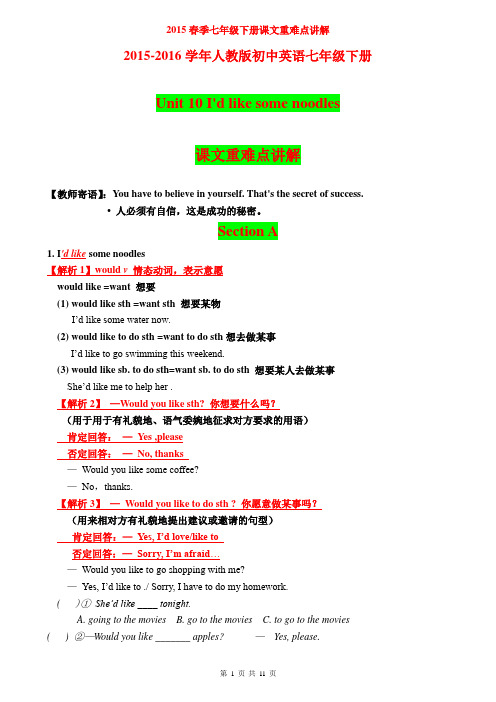
2015-2016学年人教版初中英语七年级下册Unit 10 I'd like some noodles课文重难点讲解【教师寄语】:You have to believe in yourself. That's the secret of success.• 人必须有自信,这是成功的秘密。
Section A1. I'd like some noodles【解析1】would v情态动词,表示意愿would like =want 想要(1) would like sth =want sth 想要某物I’d like some water now.(2) would like to do sth =want to do sth想去做某事I’d like to go swimming this weekend.(3) would like sb. to do sth=want sb. to do sth 想要某人去做某事She’d like me to help her .【解析2】—Would you like sth? 你想要什么吗?(用于用于有礼貌地、语气委婉地征求对方要求的用语)肯定回答:—Yes ,please否定回答:—No, thanks—Would you like some coffee?—No,thanks.【解析3】—Would you like to do sth ? 你愿意做某事吗?(用来相对方有礼貌地提出建议或邀请的句型)肯定回答:—Yes, I’d love/like to否定回答:—Sorry, I’m afraid…—Would you like to go shopping with me?—Yes, I’d like to ./ Sorry, I have to do my homework.( )①She’d like ____ tonight.A. going to the moviesB. go to the moviesC. to go to the movies ( )②—Would you like _______ apples? —Yes, please.A. someB. anyC. many( )③—Would you like to eat beef noodles. —No, _________.A. Thank you.B. thanksC. all right.2. What kind of noodles would you like? 你想要哪种面条?【解析1】kind n 种类a kind of 一种的all kinds of 各种各样的different kinds of 不同种类的what kind of 那种kind of 有几分,有点儿= a little /a bit 后跟形容词The girl is kind of shy.【解析2】What kind of …?用来询问某人需要那一种物品,后面的名词若是可数名词,常用复数形式,也可跟不可数名词。
人教新目标新七年级下unit10知识讲解省名师优质课赛课获奖课件市赛课一等奖课件
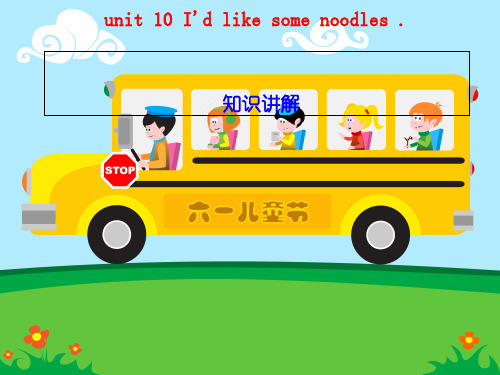
2. Would like 句型总结
1) would like + n. = want + n. e.g.
--What would you like?
2. v 钓鱼
Would you like go fishing with me? 你想和 我去钓鱼吗?
练一练:
(1)池塘里有许多种鱼。There are many __f_is_h_e_s in the pool.
(2)池塘里有许多鱼。 There are many __f_is_h in the pool.
--Would you like some bananas? -- Yes, please. / No, thanks.
4. 一般疑问句: 情态动词 would 提前: Would sb. like sth. / to do sth.?
eg: She would like to go shopping. Would she like to go shopping?
I want to play basketball. 3)would like sb.to do sth.=want sb.to do sth.
--I would like you to go with me. = I want you to go with me.
她想要羊肉和卷心菜面条。 She’d like mutton and cabbage noodles. 3. Would you like sth? 是提提议旳一种句型, 如需用某些, 用some而不用any。 肯定回答是: Yes, please. /All right. / Yes. / OK. 其否定回答是: No, thanks.
人教版英语七年级下册Unit 10 - Section A教材全解知识点课件
上课时间: 老师:
1a
• beef 不可数名词, 意为“牛肉”。 She doesn't like beef.她不喜欢牛肉。 - Can I help you? - Yes, please. I need some _______ and drinks. A. potato B. apple C. beef • noodles noodle 可数名词,意为“面条",使用时常用复数形式。 They usually have noodles for breakfast.他们早餐通常吃面条。 A bowl of chicken noodles,please.请来一碗鸡肉面。
1a
• I’m not sure yet. (1) be not sure 意为“不确定”,常用于口语中,对某事没有把握 既可单独使用,也可与of/about搭配。 - Are you free this evening?你今晚有空吗? - I'm not sure. I'm not sure about it.
1b
• Special 1 1号特色面 special 名词,意为“特色菜:特价品”,还可意为 “特价” Special 1 is my favorite. 1号特色菜是我最喜欢的。 There is a special on coffee this week.本周咖啡特价。 [拓展]①special还可用作形容词,意为“特别的:特殊的”。 specially 是其副词形式,意为“专门地;特别地”。 It's a special day today.今天是个特别的日子 Is there anything special in the newspaper today? ②与special相关的常见短语: a speБайду номын сангаасial train专列 a special hospital专科医院 special education特殊教育
新人教版七年级英语下册Unit10 Section B-1 精品课件
Guessing game
What size bowl of noodles would I like? a small bowl of noodles
a medium bowl of noodles
a large bowl of no bowl of noodles because I’m not very hungry.
Unit 10
I’d like some noodles.
Section B Period 1 (1a-2c)
Look and learn
What would you like? What kind of vegetables / meat would you like? I’d like some …
beef
cabbage
mutton
tomatoes
Guessing game
What kind of noodles would I like?
I’d like tomato noodles. beef and tomato noodles.
mutton and potato noodles.
chicken and cabbage noodles.
Special meaning
Blowing out candles on a cake makes a wish come true. It is lucky to find a candy in a cake.
Long noodles mean long life. Eggs mean life and good luck.
green tea
two
small _________________ juices.
人教新版英语七年级下册Unit10SectionB2a3c课件共35张PPT
In _C__h_in__a__, it isg_e_t_t_in__g_p__o_p_u_l_a_r to have cake on your birthday. But many people still eat very _lo_n_g__n_o__o_d_l_e_s_f_o_r__th__e_ir__b_ir_t_h_d_a_y. They never cut up the noodles because the long noodles are a symbol of long life. In some places, Chinese people also eat eggs on their birthday. They are a symbol of life and __g_o__o_d__lu_c_k_. All of these birthday foods may be different, but the ideas are _t_h_e__s_a_m__e_. They bring good luck to the birthday person.
蜡烛在生日蛋糕上,我们刚刚把它们吹灭。
4. If he or she blows out all the candles in one go, the wish will come true.如果他(她)一口气吹灭所有的蜡烛,愿望就会实现。
1) if conj. 如果 引导条件状语从句,在 从句中,if 和条件句位置 灵活,可直接放在主句后面,假设 if 条件句放句首, 从句后面要 加逗号,和主句隔开。 还要注意前后时态一致原那么
2.What do people in the UK sometimes put in a birthday cake? ___T_h_e_y_p_u__t _a_c_a_n_d_y__in__a__b_ir_t_h_d_a_y_c_a_k_e_.
(完整版)人教版初中英语七年级下册Unit10SectionA教材全解
人教版初中英语七年级下册Unit10SectionA教材全解Unit 10 I’d like some noodlesUnit 10 Section A课文全析1.Special 1特色菜1(1号特色菜)【重点注释】special在此是可数名词,在这里表示“特色菜;特价商品;特别的东西;特殊的事物”之意,有时可作“特别之物;特别节目;特刊”等解释。
例如:Thursday’s special is steak.星期四的特色菜是牛排。
Today’s Special!今日特价!I’d like some specials.我想要一些特色菜。
Special 1 is my favourite.1号特色菜是我最喜欢的。
We have some great specials.我们有一些很好的特价品。
【拓展记忆】special作形容词时,意为“特别的,特殊的”。
Specially是其副词形式,意为“特别地”。
例如:There is nothing special for me today.对我来说,今天没什么特殊的。
I would like to give you a special present.我想要给你一份特别的礼物。
It’s a special day today.今天是个特别的日子。
Is there anything special in the newspaper today?今天报纸上有什么特别的东西吗?【注意】与special相关的短语:a special train专列;a special hospital专科医院,special education特殊教育。
【试题链接】——What was Jim wearing at the party?——Nothing .He was in his usual shirt and jeans.A.specialB.simpleC.importantD.interesting (答案:A)2.What would you like?你想要什么?【重点注释】would like意为“想要,愿意”,相当于want,但语气比want更加委婉,多用于口语中,would like没有人称和数的变化,后接名词或代词。
- 1、下载文档前请自行甄别文档内容的完整性,平台不提供额外的编辑、内容补充、找答案等附加服务。
- 2、"仅部分预览"的文档,不可在线预览部分如存在完整性等问题,可反馈申请退款(可完整预览的文档不适用该条件!)。
- 3、如文档侵犯您的权益,请联系客服反馈,我们会尽快为您处理(人工客服工作时间:9:00-18:30)。
Unit 10 I’d like some noodles.Section A 1a — 1c (P55)* 教师寄语:An apple a day keeps the doctor away. 一天一苹果,医生远离我。
【学习目标】【学习重点】:1、学习常用食物词汇;2、学会如何预定食物。
--What would you like? -- I’d like some…./I’m not sure yet.【体验学习】:预习交流根据单元标题和图片等,预测新课内容;根据音标拼读单词并牢记;自学课文,勾画出重点和疑惑。
II、翻译官1. 想要,喜欢_________________2. 牛肉面____________________4. 鸡肉_____________________5. 羊肉______________________3. 卷心菜___________________ 6. 胡萝卜_____________________7. 土豆(复数) _______________ 8. 西红柿(复数) _______________9. special ___________________ 10. 我还没想好。
_______________【课堂导学】:I、新课呈现Step1 Brainstorming(头脑风暴)Try to speak out the names of food you know.Step2 PresentationLearn the new words about food in 1a.Finish 1a, then check the answers.Look at the picture in 1a and learn the drills:--What would you like? -- I’d like some….Step3 ListeningListen and finish 1b. Check the answers.Step4 Pair workPractice the conversations in 1a .Then make your own conversations.II、合作交流Group work: 分析总结如何预定食物,并练习造句。
Notes:_________________________________________________________ _________________________________________________________ 【自主检测】:I、精挑细选( ) 1. – What’s her favorite vegetable?--__________.A. Eggs.B. Bananas.C. Cabbages.( ) 2. Dale likes _______ very much.A. tomatoB. tomatoesC. tomatos( ) 3. What would you like _______ breakfast?A. forB. onC. atII、完美呈现Some _________ (beef) is in the box.Mutton _________ (be) my favorite food.Bring me some __________ (orange), and I want to make orange juice.I like rice. But my sister ____________ (not like) it.Ⅲ、连词成句you, like, what, would (?)___________________________________________________________ noodles, like, please, the, I’d , beef (.)___________________________________________________________sure, not, I yet, am (.)___________________________________________________________【快乐链接】英汉对对碰:Match each word with the right Chinese meaning.Unit 10 I’d like some noodles.Section A 2a — 2d (P56)* 教师寄语:An apple a day keeps the doctor away. 一天一苹果,医生远离我。
【学习目标】【学习重点】:继续学习如何预定食物,并会表达自己的喜好和选择。
--May I take/ have your order? -- (Yes.) I’d like some….--What kind of noodles would you like? -- I’d like beef noodles, please.--What size would you like? -- Large, please.【体验学习】:预习交流根据图片和对话等,预测新课内容;根据音标拼读单词并牢记;自学课文,勾画出重点和疑惑。
II、翻译官您可以点菜了吗?_________________ 2.小,中,大____________________ 3. What size…? ______________________ 4. 一大碗…___________________ 5. gongbao chicken___________________ 6. 麻婆豆腐___________________ 【课堂导学】:I、新课呈现Step1 BrainstormingTry to speak out the food you know.Step2 PresentationLearn more food and the new words in 2a.Look at the pictures in 2a, try to ask and learn. eg:--What kind of noodles would you like? -- I’d like beef noodles, please.--What size would you like? -- Small/Medium/Large, please.Step3 ListeningListen to 2a and check the food you hear.Go through the sentences in 2b.Listen and finish 2b. Check the answers.Step4 Pair workAsk and answer questions with your partner. Finish 2c.Role-play the conversations in 2d.II、合作交流Group work: 分析总结如何预定食物,并模仿2d编写对话。
Notes:__________________________________________________________ __________________________________________________________ 【自主检测】:I、找朋友( ) 1. I would like a cup of tea.A. likeB. wantC. have( ) 2. China is a large country.A. very bigB. very smallC. not big or small.( ) 3. --What would you like?-- A cup of juice, please.A. a kind of foodB. a kind of vegetablesC. a kind of drinkII、你来我往A: Good morning, sir! 1.________________B: Yes. I’d like some noodles.A: 2. _________________B: Beef noodles, please.A: What size would you like?B: 3. _________________A: Anything else?B: No, thanks. 4.___________________A: Six yuan. 5.___________________B: Yes. I will eat here.A: Please wait and it will be OK soon.【快乐链接】你知道这些有关食物的短语和句子吗?让我们一起来做快乐的收集者吧!* go bananas发疯的* the big cheese 很有影响力的人* as cool as a cucumber 非常冷静,镇定自若* couch potato 极为懒惰的人;成天躺着或坐在沙发上看电视的人* You can't have your cake and eat it, too. 鱼与熊掌不可兼得。
* If life gives you lemons, make lemonade. 意思是在困境中也要做到最好。
Unit 10 I’d like some noodles.Section A Grammar Focus— 3c (P57)* 教师寄语:An apple a day keeps the doctor away. 一天一苹果,医生远离我。
【学习目标】【学习重点】:1、总结归纳Section A部分语法重点;2、并将所学知识学以致用。
【体验学习】:预习交流根据Grammar Focus, 归纳Section A部分语法重点;自学课文,勾画出重点和疑惑。
【课堂导学】:I、新课呈现Step1 Grammar FocusGive a summary about it.Try to recite it.Step2 PresentationGo through sentences in 3a. Complete the conversation.Check the answers and practice the conversation.Step4 Group workWrite questions and answers using the words in brackets. Finish 3b.Work in groups. Who would like the food in 3c? Write their names on the cards above the food.According to 3a, 3b, 3c, make your own conversations.Show time: act out your conversations. eg:--Anna, What would you like to eat? -- I’d like beef noodles with carrots.--What size would you like? --A medium bowl, please.--Are there any …? -- ….II、合作交流1. Group work: 总结归纳Section A部分语法重点Notes:___________________________________________________________________________________________________________________ 2. Group work: 单词归类可数名词:____________________________________________________不可数名词:__________________________________________________可数名词&不可数名词:_________________________________________【自主检测】:完形填空It’s 12 o’clock. A man goes into a restaurant for _ _1 _ . “Hi! Can I __ 2 _ you?” a waiter says. “I’d like some French fries, a __ 3 and a medium Coke,” says the man. “__ 4 _ else ?” asks the waiter. “No,” the man answers. “That’s _ _5 . ”“For here or to go?” asks the waiter. “To go, please,” says the man. The waiter puts the food into a bag. Then the man goes away __ 6 _ the bag. “Have a nice day,” the waiter says.The man walks to the park. He sits down and opens the bag. There _ _7 _ a hamburger, some French fries and a Coke. There is also some _ _8 _ in the bag. “That’s the money for my lunch,”says the man. Then he goes back to the _ _ 9 _ because he doesn’t want to __10_ his lunch for free. He is really a good man. ( ) 1. A. breakfast B. lunch C. dinner( ) 2. A. ask B. call C. help( ) 3. A. hamburger B. dumpling C. tomato( ) 4. A. Anyone B. Anything C. Something( ) 5. A. all B. her C. his( ) 6. A. of B. with C. from( ) 7. A. am B. is C. are( ) 8. A. money B. beef C. cabbage( ) 9. A. park B. house C. restaurant( ) 10. A. get B. give C. play【快乐链接】Riddle (谜语) --- 打食物名1.What kind of dog doesn’t bite or bark?--- hot dog2.What is the smallest room in the world?--- mushroom3.What table is in the field?--- vegetable4.What stays hot even if put it in a fridge?---pepper5.What is the only vegetable that will make you cry?--- onion6. My first letter is in "tea", not in "sea". My second letter is in "those", not in "these" My third letter is in "fine", not in "nine" My forth letter is in "buy", not in "boy".---tofuUnit 10 I’d like some noodles.Section B 1a — 1e (P58)* 教师寄语:We are what we eat. 吃什么是什么(身体健康状况)。
